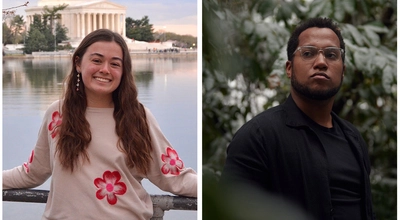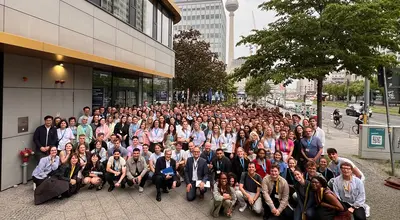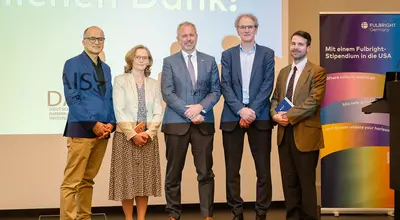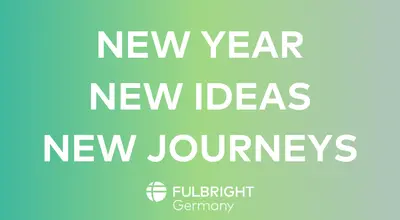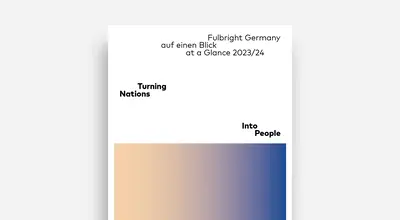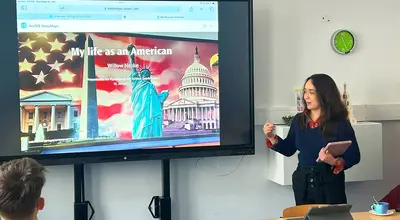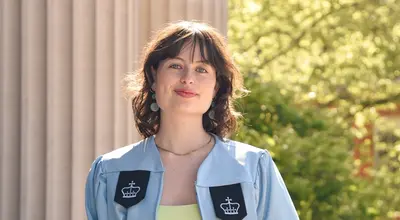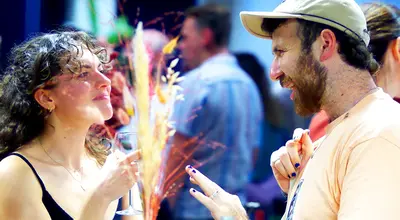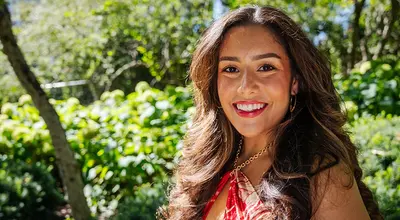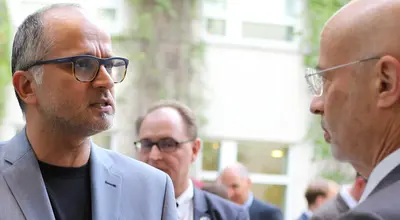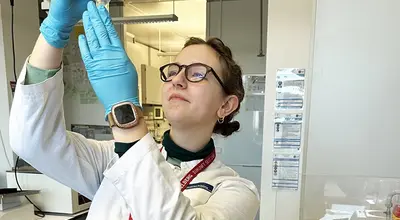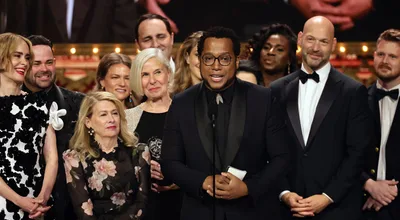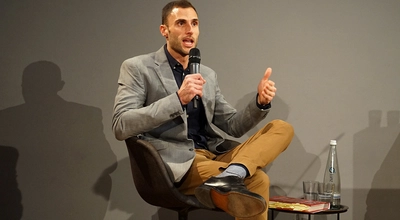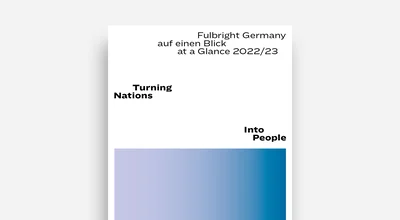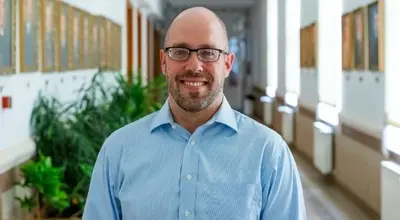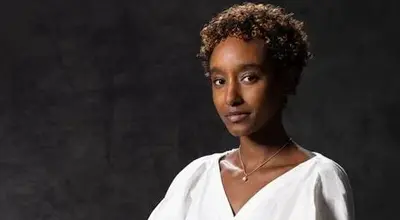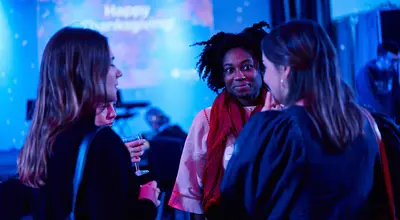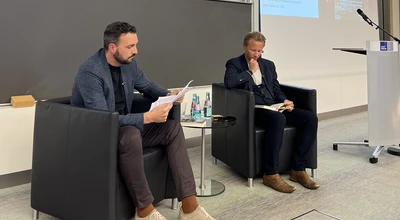Teaching Science Communication: the 2024 Fulbright-Cottrell Workshop September 25-27, 2024

Saarbrücken - September 25-27, 2024
A workshop on science communication
for faculty and researchers
Are you interested in effectively communicating science?
This workshop will provide you with tools for successful communication outside traditional conference seminars, posters and journal articles. Learn how to create a science communication strategy that tells your story impactfully.
In today's world, sharing scientific discoveries with colleagues and the general public is not only the responsibility of professional communicators but also a necessary skill for all scholars. This workshop is co-taught by a scientist and a communication professional to provide hands-on experiences and real-world examples.
Let us help you build your communication strategy plan and enhance your science communication skills! Participants will fill their science communication “toolbox,” learning how to engage a variety of audiences, including the public, journalists, and policymakers.
There will be a strong emphasis on how to teach these skills in the classroom:
- As embedded exercises in a STEM course
- As a stand-alone science communication course
- As an institute-wide program
Participants will practice active-learning techniques that have been tested and effectively used to teach these science communication skills from undergraduates through graduate students and postdocs.
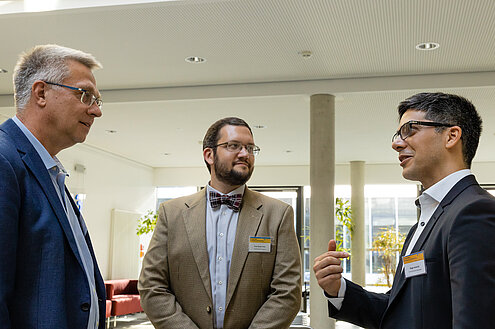

Essential workshop info
Registration - deadline September 3, 2024
Complete registration form here
Participation in the workshop is complimentary, and includes attendance at workshop activities, accommodation and most meals. Workshop-related travel is not included.
* Space at the workshop is limited. Should space remain after the deadline, late registrations may be considered. Once workshop is full, additional registrants will be placed on a waitlist and preference for workshop participation will be given to registrants in the natural sciences.
** Workshop certificates of attendance will be available upon request.
Program
See workshop schedule here
Workshop begins with a welcome reception on September 25 at 10:00 am, and the program concludes on September 27 at 1:00 pm.
Target audience
Having traditionally complemented the Fulbright-Cottrell Award, this workshop is customized for current and future postdoctoral researchers, junior group leaders, Juniorprofessor:innen, habilitated researchers, Privatdozent:innen, and equivalent who are working in the natural sciences and related fields.
Venue
Campus, Gebäude C4 3 (Chemistry Lecture Hall)
Universität des Saarlandes
66123 Saarbrücken
Reserved hotel accommodations conveniently located in city center
Premier Inn Faktoreistraße 2, 66111 Saarbrücken
Motel One Schillerplatz 4, 66111 Saarbrücken
Workshop venue may be reached by bus within 15 minutes.
* Those wishing to arrive on March 24 due to longer-distance travel to Saarbrücken should contact workshop organizers to arrange an additional night's accommodation (subject to availability).
Childcare for participants' children
Childcare on site shall be arranged by workshop participants in need (see registration form). Small grants distributed via application for funding are available to support childcare. Funding criteria and related communications with workshop participants about childcare funding will be handled by workshop organizers.
The university offers event-support childcare (Veranstaltungsbetreuung). See more info here, and parents may also contact Dominik Munz.
Questions about the workshop:
Please send email to Dominik Munz or Günther Thiele.
This workshop is sponsored by the Federal Ministry of Education and Research and the German-American Fulbright Commission, which administers the annual Fulbright-Cottrell Award in collaboration with the American Research Corporation for Science Advancement.


Key workshop focus areas:
Strategic science communication and outreach
- Why do you need a strategy?
- Assessment: who you reached and what impact it had
- Theory behind practice: the science of science communication
- What does inclusive science communication mean to you?
- Evidence-based science communication
- Explore how AI will impact scicomm
Storytelling in science:
- Enhance information literacy for finding, evaluating, and using information
- Combat misinformation
- Utilize storytelling frameworks and platforms tailored to your discipline
- Using the messaging triangle to distill complex stories effectively
- Address your expert blind spot
- Engage diverse audiences
- Navigate public engagement through digital platforms and public science events
Teaching science communication:
- Implementing active learning for embedding science communication training in your classes
- Getting started with building your science communication syllabus
- Explore institution-wide science communication programs
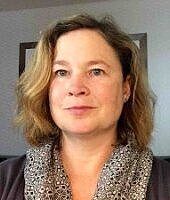
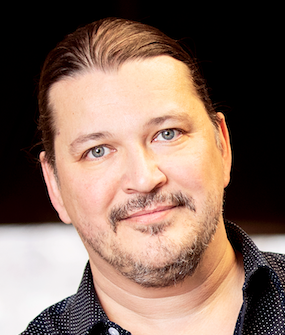
Workshop speakers
Kitty Gifford
Independent consultant, US
Mark Sarvary
Cornell University, US
Kitty is an independent communication consultant and brings her real-life experience of working with clients into the classroom. She helps clients in higher education and in the non-profit sector with digital communications strategies using a mixture of online tools and social networking sites. She holds an M.S. in Communications from Syracuse University, S.I. Newhouse School of Public Communications. She has worked in the industry for five years at a design and advertising agency, Communiqué Design & Marketing, serving as director of social and digital strategy. Previously she was on the project staff in the Citizen Science department at Cornell Lab of Ornithology where she launched social network platforms and fielded thousands of breeding bird biology questions. Kitty is a native Californian and completed her undergrad degree at Humboldt State University behind the Redwood Curtain in Northern California. She majored in Biology and Environmental Science.
Mark is an instructor in biology, science literacy, and science communication at Cornell University and conducts discipline-based education research. He received his Ph.D. from Cornell University in entomology and his two Master’s Degrees in ecology and in marketing in Hungary. He is a Faculty Fellow For Engaged Scholarship and a Fellow at the Carl Sagan Institute, where he leads the public engagement efforts. He conducts research in biology education, science communication, and public engagement.
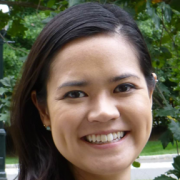
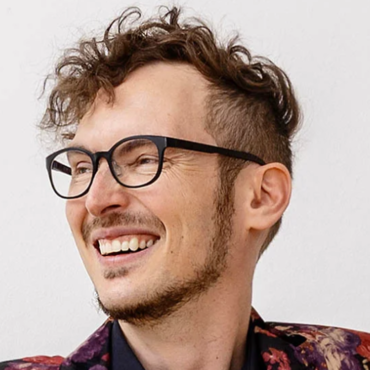

Elisabetta Matsumoto
Georgia Institute of Technology, US
Bernd Riedel
Ellery Studio, Germany
Rae Robinson-Anderson
University of San Diego, US
Info on and scenes from prior workshops in the series:
This workshop series began in 2017 as an initiative of the Cottrell Scholars Collaborative. It adapts aspects of two established programs, the CSC New Faculty Workshop and CSC Academic Leadership Training Workshop, to the German academic landscape.
2023: Building Bridges: The Fulbright-Cottrell Workshop in Dresden
2021: Building Bridges: The Fulbright-Cottrell Workshop, Virtual Edition online
2019: Fulbright-Cottrell Junior Faculty Professional Development Workshop in Göttingen
2018: Fulbright-Cottrell Junior Faculty Professional Development Workshop in Berlin
2017: "Bridges to Germany" Workshop in Mainz


Feedback from past participants in the workshop series:
“This is a great workshop for early career academics to learn about different ways... [of] teaching, researching, mentoring, leading and [finding] funding opportunities.”
“... this was a great intercontinental networking opportunity.”
“This workshop provides insights into those duties of a future professor which are not part of... standard research training and thus highly recommendable to all senior researchers.”
“It has been one of the most vibrant and enthusiastic workshops [in which] I’ve participated.”
"Absolutely excellent workshop that should be mandatory for all junior faculty."
"The 'active teaching' lessons were very insightful. The contact with people just a few steps ahead in [their] career was encouraging."
"I liked the emphasis on the teaching side. I find teaching an essential part, as we are responsible to equip the students with the knowledge and tools they need to drive our world forward."
"I learned a lot of tricks to make the most of combining teaching and research."
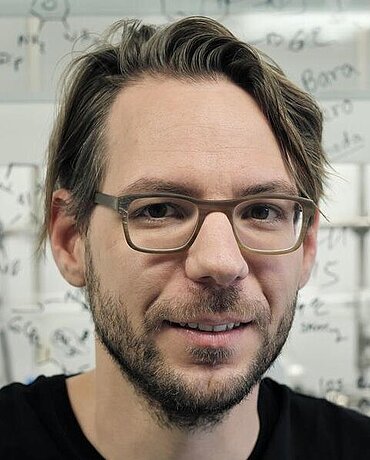

Workshop organizers
Dominik Munz
Universität des Saarlandes, Germany
Günther Thiele
Freie Universität Berlin, Germany
